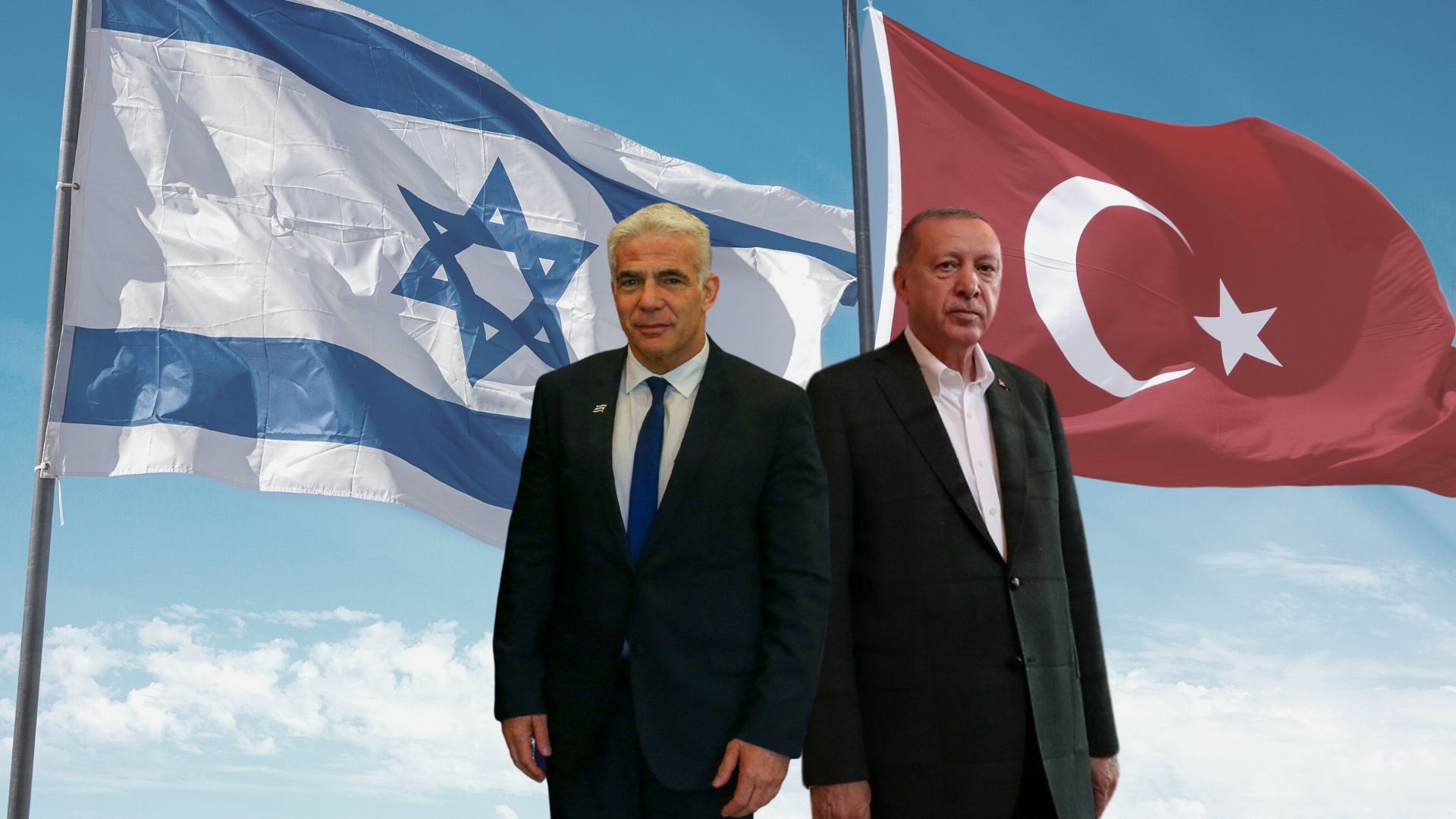The process of normalizing relations between Turkey and Israel that began in late 2020 was completed this month with the announcement that the two countries will return their ambassadors after years without senior diplomatic representation. At the same time, many challenges that could potentially complicate relations between the countries remain – alongside the opportunities inherent in the normalization
The decision by Turkey and Israel to normalize their relations stems from several processes that brought the Turkish side to push for normalization and the Israeli side to respond affirmatively. Yet alongside the serious motivations of the two sides to continue this process, there are issues that could become obstacles. Among them are the developments between Israel and the Palestinians, Turkey-US relations, the dynamics of Turkey’s integration in processes related to the Abraham Accords, and the nature of future Israeli plans regarding gas exports. Nonetheless, coping with challenges related to these issues will be easier with senior diplomatic representation present in both countries.
On August 17, 2022, Turkey and Israel announced their decision to return their ambassadors and consuls general and thus to reach full normalization in their relations. Unlike previous normalization efforts, in particular in 2013-2016, it appears that this time it is Turkey that has pushed to advance the process, while Israel has acted cautiously. Jerusalem’s positive response to Turkey’s overtures occurred after Turkey demonstrated its seriousness against the backdrop of a series of events, which helped overcome some of the suspicion remaining between the sides. From Turkey’s perspective, it is presumably better to complete the process before the upcoming Knesset elections. The timing of the decision to renew diplomatic relations also leaves enough time before the elections in Turkey, scheduled for June 2023; as such, while anti-Israel feelings are common among the Turkish public, the normalization will not significantly influence voters’ considerations.https://www.youtube.com/embed/Z_7ykkg9p_Q?&autoplay=0&showinfo=0&autohide=1&rel=0&wmode=transparent
The current improvement in relations between Ankara and Jerusalem is based on several processes, replete with challenges that exist alongside possible points of connection. Among them:
Given the many tensions in relations between Washington and Ankara, Turkey eyes better relations with Jerusalem as a way to improve relations with the Biden administration as well. Although the Biden administration has been much less active than was the Obama administration in efforts to help improve relations between Turkey and Israel, it is clear that an improvement in relations between Ankara and Jerusalem is viewed positively by Washington. National Security Advisor Jake Sullivan and the United States embassy in Turkey even tweeted congratulations on the normalization of relations between Ankara and Jerusalem. In the future however, Ankara could connect a possible deterioration of Turkey-US relations to its relations with Israel. For example, in July this year, Congress passed restricting amendments concerning the sale of F-16 jets to Turkey, placing obstacles in the way of the deal supported by the Biden administration. At the time, the American Jewish Committee (AJC) joined a Greek diaspora organization in a letter to members of Congress, which expressed support for the amendments. Aside from this, even though Washington recognizes the positive role of Turkish mediation regarding the war in Ukraine, the US frustration over Turkey’s acquisition of S-400 air defense systems from Russia, as well as Turkish aid to Russia in circumventing the economic sanctions, remains.
In the regional context, normalization with Israel dovetails well with the normalization processes that Turkey is pursuing with other countries in the Middle East, including the United Arab Emirates, Saudi Arabia, and Egypt. Even though Turkey opposed the Abraham Accords, in many senses it is striving to exploit opportunities in this regional dynamic. In addition, the recent positive signs from Ankara toward Bashar al-Assad, after years of heightened tension between Turkish President Recep Tayyip Erdogan and his Syrian counterpart, are even more dramatic than the normalization of relations with Israel. Indeed, the two processes are essentially two sides of the same coin – resetting Turkey’s regional policy. The various normalization efforts feed off each other, and as long as Turkey is convinced of their benefits, first and foremost from an economic perspective, it is expected to maintain them. At the same time, Turkey has exhibited greater rigidity in its contacts with Greece and Cyprus, and the recent launch of Turkey’s fourth drilling ship raises concerns of Ankara’s possible return to assertive conduct in the Eastern Mediterranean, as was the case in 2018-2020 – conduct with consequences beyond Turkey’s relations with these two countries.
The Palestinian issue could also influence the future of normalization, and Turkey is trying to balance its relations with Israel and its relations with the Palestinians. Indeed, Palestinian Authority President Mahmoud Abbas visited Turkey a few days after the announcement of normalization between Turkey and Israel. Over the past decade, Erdogan has attempted to position himself as the most prominent Muslim leader defending the rights of the Palestinians and Muslim life in Jerusalem. This policy was expressed partly in harsh statements against Israel, which he even called a terrorist state. However, in the last month of Ramadan and even during Operation Breaking Dawn, Turkey’s official response was less negative toward Israel than in the past. According to Erdogan and his supporters, normalization with Israel does not entail giving up on the Turkish position on the Palestinian issue. They claim that good relations with Israel enable Turkey to express its position directly and thus to defend the rights of Palestinians, with Jerusalem and al-Aqsa being a red line. A significant number of Hamas members reside in Turkey, and thus Ankara’s position on the organization could well challenge the continuation of the normalization process. Despite signs of a certain change in Turkey’s conduct toward Hamas, in particular the expulsion of several Hamas operatives from its territory, it is doubtful that Erdogan will respond positively to all of Israel’s demands related to the organization.
In the economic context, figures on trade between the countries reached a historic high in 2021 – an increase of more than one billion dollars from 2019 and 2020, with mutual trade reaching approximately $7 billion (out of which $4.7 billion are Turkish exports to Israel and $1.9 billion are Israeli exports to Turkey). Turkey is one of Israel’s top five trading partners, while Israel is one of Turkey’s top ten export markets. A joint committee is expected to convene in September that will discuss the trade barriers that remain between the countries, partly because the free trade agreement between the countries, which entered into force in 1997, must be updated. However, even if the trade agreement is updated, the question arises whether trade relations can grow significantly. The aviation agreement signed between the countries in July 2022 and the settled dispute that existed since 2007 regarding security arrangements for Israeli airlines in their flights from Turkey paved the way for the renewal of these airlines’ flights in a way that resolves, at least partly, the asymmetry that existed in aviation ties between the countries. But in light of the stiff competition expected with Turkish commercial airlines in the various flight routes between Israel and Turkey, it is doubtful that these routes will be profitable for Israeli operators.
One of the issues that Turkey is interested in advancing as part of improved relations with Israel is the export of Israeli natural gas to or through Turkey. Officials, experts, and commentators from Turkey highlight that building a gas pipeline to Turkey was the first possibility that Israel considered when it examined how to export its gas, and they see the restoration of relations between the countries as a good opportunity to revive the project. This is especially true in light of the difficulties facing the alternative project, the EastMed pipeline, between Israel, Cyprus, and Greece. A pipeline that transports Israeli gas to Turkey could help Ankara diversify its suppliers and reduce its heavy dependence on Russian gas. In addition, it has the potential to strengthen Turkey’s standing as a natural gas transit point to European markets. At the same time, the asymmetry between Israel and Turkey regarding the interest in pursuing cooperation on this issue is evident, and the Israeli side has not made any public commitments about it. Geopolitically, the project of constructing a gas pipeline to Turkey could create tension between Israel and its regional partners: Greece, Cyprus, and even Egypt, which currently exports some of Israel’s gas via its liquefaction facilities. Furthermore, it is still not clear whether such a project has economic viability, considering the available amount of Israeli gas, production costs, and existing Israeli commitments to other countries.https://www.youtube.com/embed/pDra_afmjIM?&autoplay=0&showinfo=0&autohide=1&rel=0&wmode=transparent
Future bilateral relations could well proceed in one of two scenarios. A positive scenario emphasizes that a transition to proper relations between Israel and Turkey enables both to focus attention on the central challenges or threats they face: Iran, Hezbollah, and Hamas for Israel, and the Kurdish issue for Turkey. The restoration of relations between the countries also opens up opportunities for cooperation that can be fruitful. It is important to consider how, in coordination with Jerusalem’s allies, Ankara can be integrated in new regional forums. Turkey can also play an important role in the Israeli policy of gestures to the Palestinian population, as intended, for example, in the pilot program of flights for Palestinians from the West Bank via Ramon Airport, which are expected to be operated in part by Turkish commercial airlines. Maintaining the mechanism of dialogue that exists between Erdogan and Israeli President Isaac Herzog will enable the two countries to resolve disagreements, especially on the Palestinian issue, without a head-on collision. There is also potential for cooperation on issues related to climate change, in particular technologies for the efficient management of water supply, which could be a basis for projects that other countries would join.
On the other hand, concern that the current normalization is fragile, similar to the normalization in 2016-2018, stems from several reasons: a new government in Israel after the November elections, if it doesn’t continue a policy of even limited gestures towards the Palestinians, will be difficult for Ankara. Electoral considerations by Erdogan and his party up to the June 2023 elections could likewise impact negatively on the quality of relations between Jerusalem and Ankara. A future deterioration in the arena of the Israeli-Palestinian conflict, by no means impossible, would also be expected to have a negative effect on relations. Incidents surrounding the arrest of tourists from Turkey, due to concerns of cooperation with terrorist elements, as occurred several times before the outbreak of the COVID-19 crisis, could recur. Especially in a dynamic of improved relations, it is possible that there would be pressure from Turkey on Israel to enable Turkish initiatives among the Palestinians and within Israel and Jerusalem, some of which could be seen by Israel as potentially problematic.
Against the backdrop of the current process of normalization, the possibility has arisen of Erdogan visiting Israel again (his first and only visit was in 2005). Such a visit should be planned carefully so that it helps improve relations and prevents incidents during the visit that may contribute to negative trends in bilateral relations. However, it will be easier to cope with all the challenges listed above when there is senior diplomatic representation in both countries, and thus the normalization process, wherever it leads, in itself has a moderating effect.
By: Gallia Lindenstrauss Remi Daniel
Source: INNS



